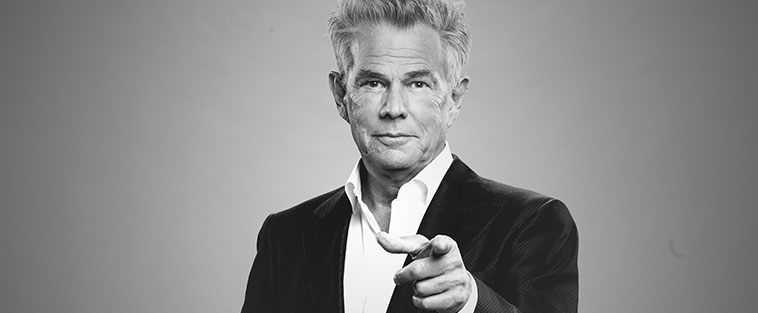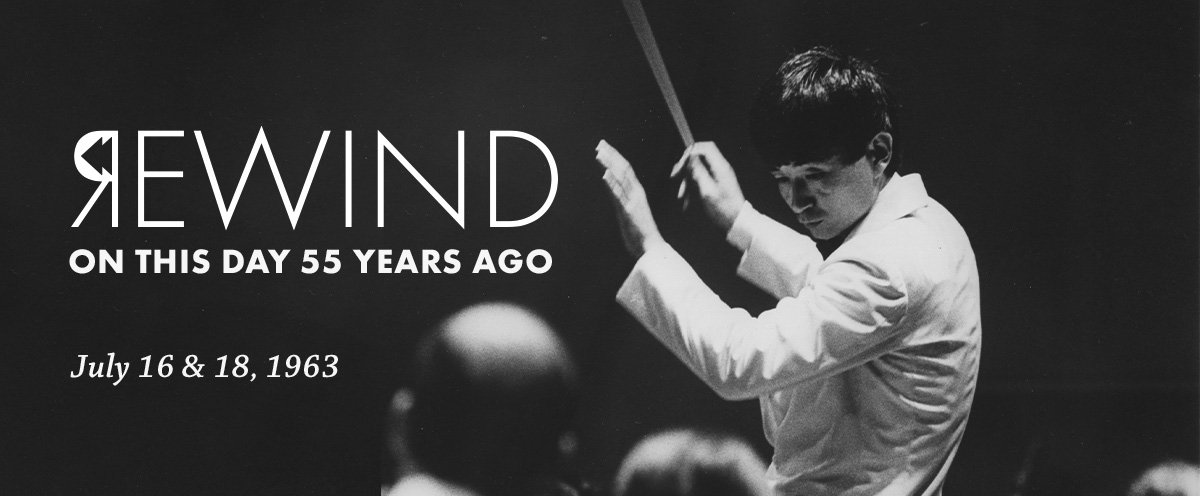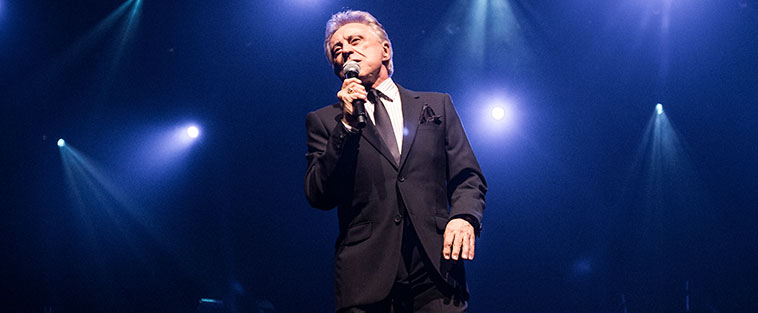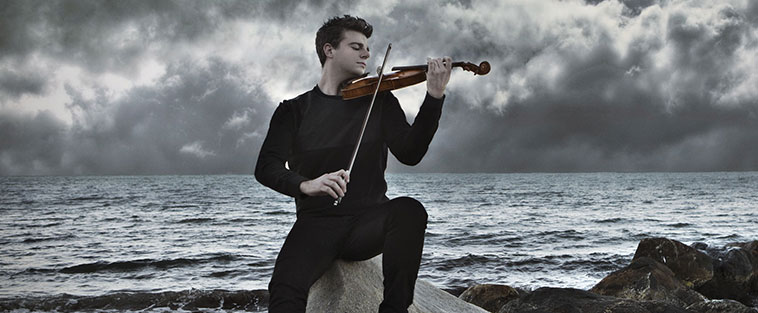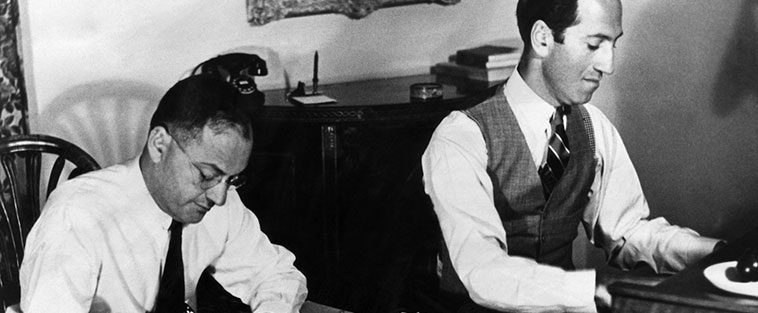Jazz pianist and composer Dan Tepfer is releasing his album Natural Machines tomorrow, May 17, with a twist. On this album, Tepfer plays a unique digital player piano called the Disklavier, which takes the music he plays on the piano, runs it through a computer program he wrote, and plays it back over the instrument.
Read MoreRavinia Magazine
Bless the Child: Shemekia Copeland has got her bold
These days, “Your Mama’s Talkin’,” a song from Chicago-based blues scion Shemekia Copeland’s 1998 debut album, Turnin’ Up the Heat, has taken on a whole new meaning. Copeland became a parent in 2016, and when she isn’t wrangling her “little man,” she says she’s thinking about “the type of world I brought him into, and my concerns for him and what he will have to face.”
Read MoreTuning Up: Musicians and conservatories break the cycle of performance injuries
Melissa White and Elena Urioste got through the beginnings of their professional violin careers without thinking much about their bodies. If they had performance-related pain, they ignored it as long as they could.
Then, in 2009, they separately found yoga.
Read MoreWhere Can I Find a Career Like That? Rick Springfield is always writing up, never off
For the 69-year-old Australian-born Richard Lewis Springthorpe (his real name), the Grammy Award–winning song would be life-changing. At the same time, however, Springfield was still an unproven entity; prior album releases did well, but radio play and massive sales were not yet happening for him in the age of MTV. So, the singer-songwriter took a role as the uber-handsome and dashing Dr. Noah Drake on the daytime soap opera General Hospital—just to ensure he got a steady paycheck, he says.
And then it happened.
Read MoreThe Write Stuff: John Prine delivers a darling for a Hall of Fame year
More than 50 years ago, Prine returned home from an Army stint in Germany and began work as a US postal carrier. Daily and dutifully walking the unapologetic, diversely populated, middle-class streets of his west-suburban Chicago hometown, he mentally molded melodies and lyrics in his head to break the monotony of his Maywood, IL, mail route.
Read MoreAll Smiles: Rob Thomas is living for good
It was 2015, and Rob Thomas was scared to death.
His wife, Marisol Maldonado, was waiting for her phone to ring, waiting to hear what the doctor had to say about the tunnel vision she had been experiencing, waiting to find out if the lesion that the MRI had found at the base bone of her brain was something that would change their lives forevermore.
And there they were, one of music’s biggest music hit makers and one of the world’s most beautiful models sitting in a dreary parking lot in Chicago, waiting to learn their collective fate.
Read MoreKey Change: David Foster Embraces a New Muse in a Relatively Major (Broad)way
What Foster is doing is creating his first Broadway musical, a show based on the 1930s’ wide-eyed, Jazz Age flapper animated cartoon character Betty Boop. A creative team of Broadway A-listers has signed on for the project, including director/choreographer Jerry Mitchell, whose work includes the recently premiered Pretty Woman: The Musical, the Gloria Estefan bio-musical On Your Feet, and Cyndi Lauper and Harvey Fierstein’s critically acclaimed Kinky Boots (all three of which had their pre-Broadway tryouts in Chicago). Veteran television scribe Sally Robinson is writing the book, and Foster’s score will boast lyrics by Tony Award nominee Susan Birkenhead.
“It’s my first try at Broadway,” Foster says of the musical, whose subject matter demanded a very original story. “There never was a story because [Betty Boop] is a two-minute-at-a-time cartoon. I knew I wanted to make a step toward Broadway and musicals, and honestly Betty Boop was the first person to ask me. [Laughs.] So we had to create the story. It’s currently waiting for the script’s final punch-up. And then hopefully we’ll jump into a reading and then a workshop.”
Rewind: July 16 and 18, 1963
If anyone had a knack for defying convention with an astounding rate of success, it was Leonard Bernstein. When he became music director of the New York Philharmonic in 1958—15 years after his surprise debut with the same ensemble, then only months into his tenure as its assistant conductor—the tradition had been for those assistants to remain in the position for only one year. But then Seiji Ozawa caught his eye. The winner of the 1960 Koussevitsky Prize at Tanglewood, where Bernstein had been a close advisor for the conducting and orchestral programs since 1951, and subsequently the winner of a scholarship to study with the quintessential maestro Herbert von Karajan, Ozawa was quickly sought by Bernstein to become one of the NY Phil assistants in 1961. One of three conductors in the role, Ozawa was nonetheless a clear favorite, being chosen to lead a performance during the orchestra’s 1961 tour and retaining a close association with Bernstein, if unofficially, through the maestro’s 1965 sabbatical.
The program insert for Seiji Ozawa’s hastily arranged Ravinia and Chicago Symphony Orchestra debut
The especial attention from “America’s music teacher” of course drew the attention of other ensembles. Ozawa made debuts with the orchestras of San Francisco, Minneapolis, Detroit, and Montreal between 1962 and 1963. During the latter summer, he received a call similar to that which Bernstein received in 1943: the conductor for the Chicago Symphony Orchestra’s concerts at Ravinia has suddenly taken ill at the 11th hour, and could Ozawa come conduct his concerts. Even with a program inherited from Georges Prêtre, comprising Beethoven’s Third Leonore Overture, Grieg’s Piano Concerto, and Dvořák’s “New World” Symphony, Ozawa appointed himself well in his Ravinia and CSO debuts on July 16, with the Chicago Daily News readily recognizing the influence of “Leaping Lenny”: “While conducting, he [Ozawa] slides easily from waltz to rhumba to twist to a modified version of the Limbo … however, he remains in control of the situation. Ozawa can make an orchestra do almost anything he wants … it would be hard to name a conductor of his age more gifted, and it will be fascinating to see what becomes of him.”
Ozawa leads a rehearsal with the Chicago Symphony Orchestra during his first season as Ravinia’s Music Director, 1964
The second night, July 18, was opened up to Ozawa, which caused the Daily News to assert, “It is necessary to revise the glowing estimation that appeared in this space … because by evening’s end it was becoming hard to think of many more gifted conductors of any age. This time, Ozawa faced and passed the only worthwhile test of a conductor: he brought a new work [Takemitsu’s Requiem for Strings], rehearsed the orchestra in it thoroughly, and then secured a performance of polish and poetic imagination. Very little time should elapse before he shows up again at the head of the Chicago Symphony.” In very little time indeed—just a few days more than a month later—Ozawa was named the first music director of Ravinia, where he would bring the flair and passion for the music of his time (as well as music written specifically for his time) that he shared so similarly with his mentor, Bernstein, through the end of the decade. ■
Building Bridges: The iron is hot for fusing jazz and classical in RSMI's composition competition
It was in the spirit of the intense and aspirational goals of RSMI’s ambitious programs for jazz and classical musicians—as well as the bold musical vision of Leonard Bernstein, whom Ravinia has just gotten underway celebrating with an expansive multiyear tribute—that Bridges, an international jazz and classical fusion composition competition, was born. It offered an imaginative challenge for artists ages 17–30 (the same age range as the 60–70 performers invited to RSMI each year) to compose original works specifically for a string quartet and a jazz trio. “The Bridges competition was conceived to help give young professionals a place on the map—if not the world stage—which is precisely what RSMI has been granting singers and instrumentalists for the past three decades,” Kauffman said. The directors of the RSMI Program for Jazz had long dreamed of such a competition, having written many works combining jazz and classical music and players themselves.
Robert Chen: The CSO Concertmaster Musters a solo concert
It's an oft-told tale. A little girl, attending her first live symphony concert, is enthralled by the imposing conductor waving a baton. She turns to her parents: “Mommy, Daddy, that’s what I want to do when I grow up.” A little boy, hearing a flute or a clarinet or a violin or a tuba for the first time, is mesmerized. He clamors for an instrument of his own. Decades later, that little boy and girl have become internationally acclaimed musicians accepting the applause of audiences from San Francisco to Sydney, Australia.
Tim Fain and Nicholas Britell Bring Wide(screen) sounds with "Once Upon a Score"
Even just a decade or two ago, classical musicians might look back occasionally to the Baroque era or try out a new work, but most stuck to Johannes Brahms, Franz Schubert, and the genre’s other tried-and-true standard bearers. But today, many of the field’s younger generation of artists, who can access music from virtually any time or place in seconds on their iPhones, don’t feel nearly so confined. They might play a quartet by Ludwig van Beethoven one night and then join forces with an indie-rock band the next.
Matthew Whitaker: Taking Jazz by Ear
Imagine for a moment that you’re a jazz pianist/organist. Also imagine that you’ve made a recording, a good part of which is your own material. And while you’re at it, imagine that said recording followed several major public appearances: Apollo Theater in Harlem, Jazz at Lincoln Center, Weill Recital Hall at Carnegie Hall, and even a segment on Ellen (she loved you so much that she gave you a vibraphone!). You also own a music publishing company and have toured abroad, performing in such far-flung places as France, Italy, Morocco, and Japan. Along the way you’ve picked up some major endorsement deals from Yamaha and Hammond.
A Man For All Seasons: Frankie Valli Embraces the Moment to Keep his group on a high note
Frankie Valli and The Four Seasons never had an autumn. They are of their time, and timeless.
With his early life and crooning career chronicled in the multiple Tony Award–winning and internationally successful stage musical, Jersey Boys—along with a movie version directed by Clint Eastwood—a five-decade catalogue of blockbuster hits, and even a sinister stint on TV’s The Sopranos, Frankie Valli is a well-deserving pop culture icon.
Chad Hoopes: A Violinist Cooking Up Solo Concerts
Chad Hoopes was apportioned an arresting array of adjectives in a Washington Post review of the violinist’s Kennedy Center debut last year: “jaw-dropping,” “a little intoxicating,” “glowing,” “gripping,” “smiling-slash-snarly” (his performance of Ravel’s tempestuous Tzigane).
But it’s a verb in the first sentence that catches the eye: “The gifted young violinist Chad Hoopes has been rising—or maybe hurtling—toward international stardom since taking first prize in the junior division of the Yehudi Menuhin International Violin Competition in 2008.”
On the Surf(ace): Switchfoot Doesn't Bottle Up It's Message
At face value, Switchfoot is one of the most engaging and entertaining alternative rock acts to come out of Southern California in the last 20 years. But those who take a longer look at the Grammy Award–winning group will also find some of the most socially conscious, spiritually enlightening, and ultimately thought-provoking lyrics of their generation.
Of course, that’s yielded smash singles such as “Dare You to Move,” “Meant to Live,” and “Stars,” plus multiplatinum- or gold-selling modern day masterpieces such as The Beautiful Letdown, Nothing Is Sound, and Learning to Breathe. However, Switchfoot also built up a sizeable community of listeners who’ve been consistently challenged by the band members to make a difference in their corner of the globe. In fact, both the band and their fans did exactly that earlier this season at the 13th Annual Switchfoot BRO-AM, which merges a massive music festival and surf contest, with all the proceeds benefitting various children’s charities.
I Love a Piano, Piano: The Naughtons' Four-Handed Sibling Revelry
“I think one of the cool things about four-hand piano,” says Christina Naughton, “is that it allows the deepest communication between the two players, because it may be the only form of chamber music where the players actually share the instrument.”
“It’s fun and it’s a different form of communication than chamber music,” chimes in Christina’s twin sister and piano duo partner, Michelle Naughton. “It’s really unique to its own self. It’s an art in itself. Family is a big part of that, too, and you can see that with Mozart’s and Mendelssohn’s music: they wrote stuff to be played with their siblings who were also fantastic musicians.” Not coincidentally, four-hand piano works by those two composers are central to the Naughton sisters’ Ravinia-debut performance on August 24.
A Balance Paying Off: James Gaffigan finds an Island in Lucerne
The oft-quoted New Testament adage about prophets struggling for credibility in their own countries certainly seems to apply to American conductors. While some noted ones like James Levine and Marin Alsop have built their careers largely in the United States, others have had to make their marks in Europe before they could land a major post in their home country. Examples include David Zinman, who served as principal conductor of the Rotterdam Philharmonic prior to becoming music director of the Baltimore Symphony in 1985, and Alan Gilbert, who was principal conductor of the Royal Stockholm Philharmonic in advance of taking over as music director of the New York Philharmonic in 2009.
Rhymed Conversation: Ira Gershwin brought effortless composure to songwriting
In 1896, Morris Gershovitz and his wife, Rose, were living above a pawnshop on New York’s Lower East Side. In December of that year, the immigrant couple saw the birth of their first child, a son, whom they named Israel. In September of 1898, the Gershovitzes, now in Brooklyn, welcomed their second son, Jacob. Within a few weeks the family moved back to Manhattan, where they occupied a second-floor flat above a phonograph shop.
The Soul in his Shoes: Leslie Odom Jr. Keeps his Feet in Happening Rooms

Leslie Odom Jr. is not the kind of guy to let grass grow under his feet. Even if he wanted to, the grass wouldn’t stand a chance, given the actor/singer/dancer extraordinaire’s fancy footwork. Though now firmly fused into American consciousness for his Tony and Grammy Award–winning portrayal of Aaron Burr in the Broadway megahit Hamilton, Odom has long been demonstrating his astonishing versatility not just on stage but on television with his appearances on CSI: Miami, Grey’s Anatomy, Person of Interest, and Law & Order: Special Victims Unit, and particularly in the role of Sam Strickland in the 2013 musical series Smash. His many fans will shortly enjoy him on the big screen as well, in Kenneth Branagh’s soon-to-be-released film Murder on the Orient Express.
Feeling Lucky Punk: Chris Carrabba is Happy to Wear his Emotive Music on his Sleeve

You can’t talk emo culture without certain bands immediately rolling off the tongue: Jawbreaker, Sunny Day Real Estate, Death Cab for Cutie, Alkaline Trio, Rites of Spring—and, of course, Dashboard Confessional, whose lead singer, Chris Carrabba, became the unofficial poster boy for the genre, characterized by emotional, hardcore punk and “confessional” lyrics. When Carrabba sang “I’m reading your note over again / There’s not a word that I comprehend /Except when you signed it / ‘I will love you always and forever,’ ” a generation of music fans felt his guitar-driven angst.







